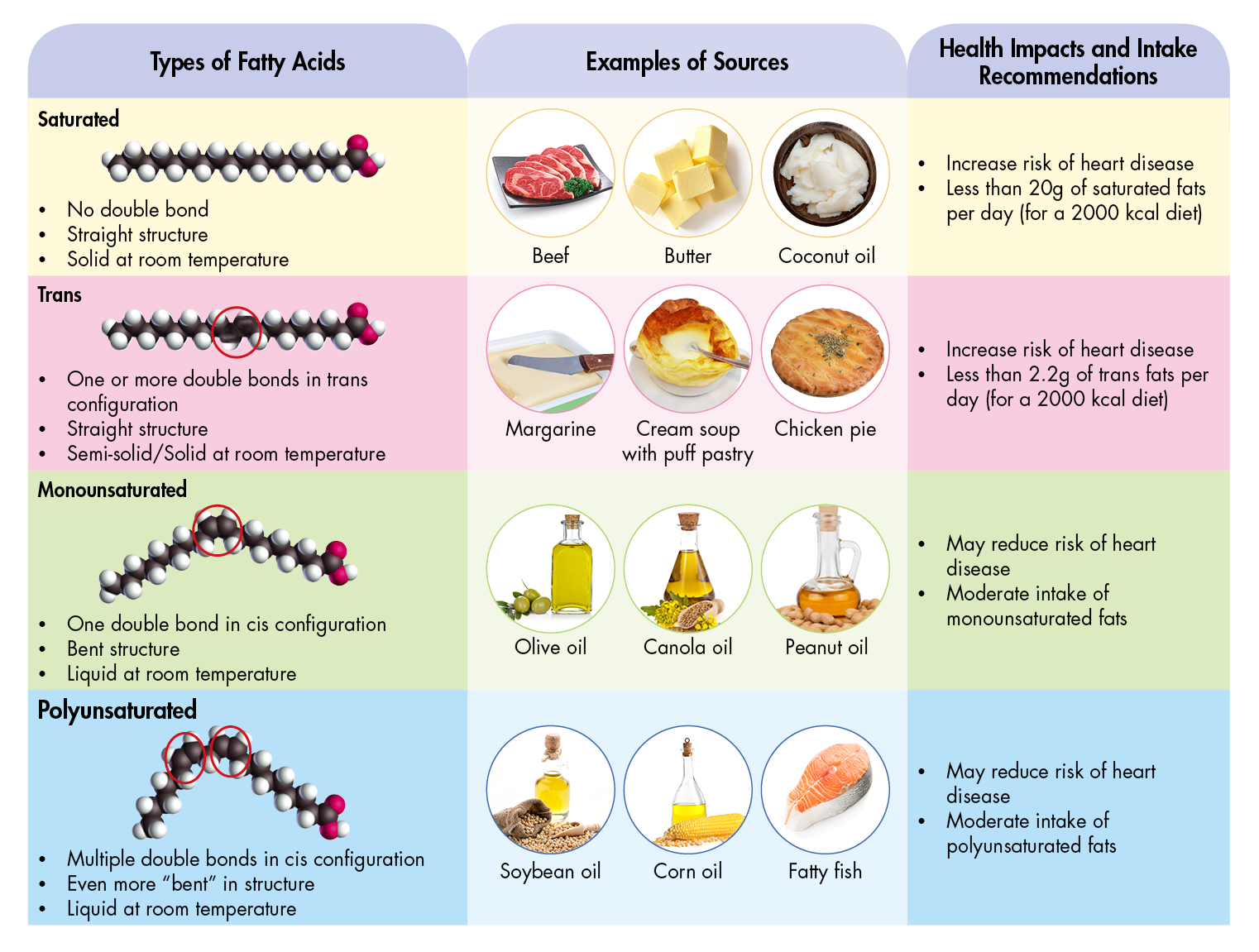
Food Safety Focus (158th Issue, September 2019) – Food Safety Platform
Different Types of Dietary Fats and Health
Reported by Ms. Melva CHEN, Scientific Officer, Risk Communication Section and
Dr. Violette LIN, Scientific Officer, Risk Assessment Section, Centre for Food Safety
Dietary fats may contain different levels of saturated fats and unsaturated fats (including monounsaturated fats, polyunsaturated fats and trans fats). According to the World Health Organization (WHO), replacing saturated fats and trans fats with polyunsaturated fats and monounsaturated fats is good for your hearts.

Summary of Types of Dietary Fats
The Facts about Fats
Fats together with carbohydrates and protein are sources of energy in the human diet. Fats are the most concentrated energy source providing 9 kcal per gram. Fats also have many other important functions in the body such as carrying fat-soluble vitamins (i.e. A, D, E and K) and serving as structural components of cell membrane.
However, excessive fat intake has been linked to major health problems, including an increased risk of heart disease, obesity, hypertension, diabetes and certain types of cancers. For preventing non-communicable diseases mentioned above, the WHO recommends 15 - 30% of total energy from total fats. For example, if a person needs about 2,000 kcal a day, 300 – 600 kcal of them should come from fats (about 33 – 67 grams) per day.
Different Types of Dietary Fats
Meats, dairy products, seeds, nuts, cooking oils and fats are sources of different types of dietary fats.
Saturated fats
Saturated fats increase low-density lipoprotein (LDL) (“bad”) cholesterol and the risk of heart disease. Sources of saturated fats are: fats from animals such as beef, lamb, pork, poultry, tallow, lard and dairy products (e.g. cheese, cream and whole milk), and some tropical oils, such as palm oil, palm kernel oil and coconut oil. Intake of saturated fats should be less than 10% of total energy intake (about 20 grams) per day.
Monounsaturated fats and Polyunsaturated fats
Monounsaturated fats and polyunsaturated fats are important parts of a healthy diet. Replacing saturated fats with polyunsaturated fats and monounsaturated fats decrease the "bad" cholesterol. The WHO considers oils rich in monounsaturated fats (e.g. canola oil, olive oil, peanut oil and oils from nuts and avocado) and polyunsaturated fats (e.g. corn oil, sunflower oil, soybean oil, safflower oil and oils from fatty fish, walnuts and seeds) as healthier oils.
Trans fats
Trans fats are the worst type of fats for heart health. Most trans fats are industrially produced, although a small amount of trans fats may be present in the meat and dairy products of beef and lamb. Trans fats not only increase the “bad”, but also decrease the high-density lipoprotein (HDL) “good” cholesterol. The WHO suggests that the intake of trans fats should be less than 1% of total energy intake (about 2.2 grams) per day. In particular, industrially produced trans fats are not part of a healthy diet and have to be avoided. They are found in foods containing partially hydrogenated oils such as margarine, vegetable shortenings and baked/fried foods.
Choosing Healthier Oils and Fats
Cooking oils and fats contain different profiles of saturated fats and unsaturated fats. A variety of healthier oils mentioned by the WHO are available on the local market. Consumers can make informed food choices by using the nutrition labels on cooking oils/fats and other pre-packaged food products to identify those containing lower saturated fats and no trans fats.


